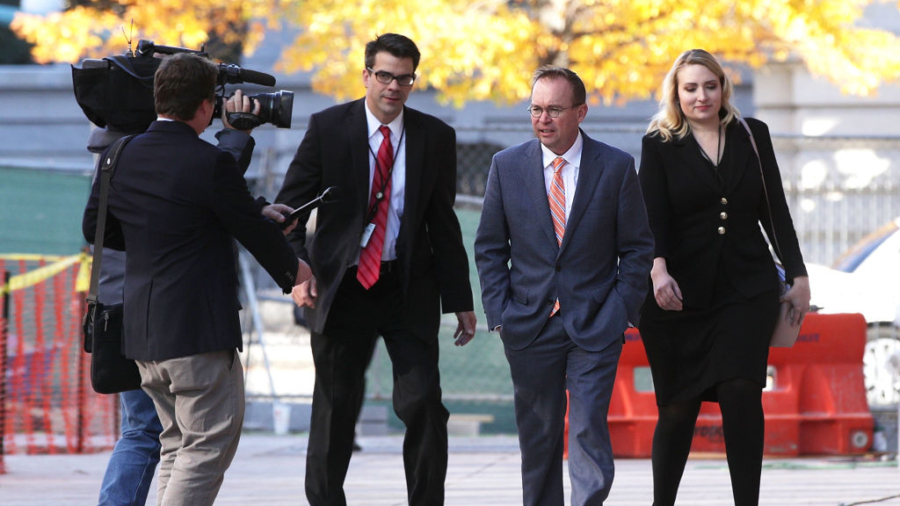WASHINGTON—The Trump administration and Obama-era bureaucrats are dueling over who will lead the Consumer Financial Protection Bureau (CFPB), with each side relying on a statute to support its position.
The consumer watchdog agency has been contentious since it was created in 2011. President Donald Trump has called the CFPB “a total disaster,” and vowed to dismantle it. The choice of who leads the agency will be crucial for determining what role the CFPB plays going forward.
“Financial Institutions have been devastated and unable to properly serve the public,” Trump wrote on Twitter on Nov. 25 about the CFPB. “We will bring it back to life!”
He appointed Office of Management and Budget Director Mick Mulvaney as the acting director to lead the agency until a permanent CFPB director is nominated and confirmed by the Senate. Mulvaney himself, while in Congress, characterized the CFPB as a “sad, sick joke,” and has called for an overhaul of the agency.
By appointing Mulvaney, Trump intends to curtail the powers of the CFPB and roll back some of its rules. However, the transition of power at the agency has turned into a legal battle.
Richard Cordray, former director of the CFPB and an Obama administration appointee, was a controversial figure, said Evan Weinberger, a senior banking reporter at Law360, a legal news service. Republicans and business lobby groups have accused Cordray of being aggressive and called him an imperial director, Weinberger said.
The conflict over the CFPB accelerated when Cordray stepped down on Nov. 24. In his resignation letter, he named his chief of staff, Leandra English, as the acting director of CFPB using the succession provisions in the Dodd-Frank Act. Passed by the Obama administration in 2010 in the wake of the 2008-2009 financial crisis, the act, among other provisions, created the CFPB.
Hours after Cordray appointed English, the Trump administration moved to take control of the agency by appointing Mulvaney as acting director of the CFPB under the Federal Vacancies Reform Act of 1998.
The conflict turned into a tricky legal fight when English sued the Trump administration on Nov. 26 and asked for a temporary restraining order to block Mulvaney from taking control of the bureau.
“It is really just a fight over temporary leadership of the bureau,” said Weinberger.
The President has the right to appoint a permanent CFPB director. However, there are conflicting legal claims for the appointment of interim leadership.
The White House claimed that the law was clear and the President had the power to appoint an acting director, while Democrats asserted the law said otherwise.
At a hearing on the evening of Nov. 28, a U.S. District Court judge denied English’s request for an emergency order blocking the appointment of Mulvaney, saying English had not shown a likelihood of success on the merits of the case. English’s attorney said the judge did not have the final say in this matter, and he and his client were considering their options.
Democrats Defend CFPB
Sen. Elizabeth Warren (D-Mass.), who is credited with having established the CFPB, accused Trump of overriding the Dodd-Frank Act.
“Trump has put a cloud of uncertainty over the @CFPB by attempting to override Dodd-Frank,” she wrote on Twitter on Nov. 26. “Mulvaney should take no action until this dispute is decided in the courts.”
Warren defended the role of CFPB by tweeting that the agency “has returned $12 billion to working families who were cheated. That’s government that works for the people,” she said.
Rep. Jamie Raskin (D-Md.) called Mulvaney’s nomination a “deeply suspicious and provocative appointment.”
“Not only does ordering President Trump’s OMB Director Mulvaney to moonlight as the CFPB director contradict the plain language of the CFPB statute but it also makes a mockery of the idea of an independent Federal agency,” he said in a press release.
CFPB has helped uncover credit abuses by banks. The bureau, for example, fined the Wells Fargo Bank last year for opening millions of fake bank and credit card accounts.
However, critics argue that the bureau, while tasked with a critical mission, needs urgent reform.
“Once this dispute is resolved (which we expect relatively quickly), the first task for the new interim CFPB director will be to set a new and likely very different course for the bureau,” stated a Law360 report.
The bureau has pushed the bounds of its authority, restricted consumer access to credit, and imposed high compliance burdens on small banks, the report argued.
Richard Parsons, author of “Broke: America’s Banking System” and a former banker who spent 31 years with Bank of America, criticized the action of the CFPB officials.
“The authors of the Federalist Papers which gave birth to the Constitution—Madison, Hamilton, and Jay—have to be rolling over in their graves,” he wrote in an email.
“There is no way the Founding Fathers would condone the CFPB.”
A lawsuit filed by a Texas bank in 2012 argues the CFPB is unconstitutional and asks that the law be revoked. The suit is still ongoing.
According to Parsons, the U.S. financial services regulatory system is the worst designed system for supervising banks in the world. “It is a patchwork of competing and overlapping agencies,” he argued.
“The CFPB is part of a larger problem facing banks and challenging the safety and soundness of the U.S. banking system.”
Please help support independent journalism by sharing this article far and wide on social media. Thanks!
From The Epoch Times


